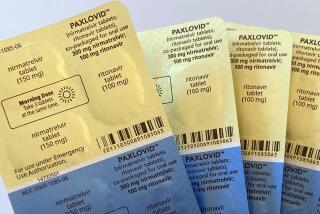Panel Urges FDA to Allow New AIDS Drug on Market
- Share via
WASHINGTON — A federal advisory panel--using new scientific measures to evaluate an experimental therapy for the first time--recommended Friday that the AIDS antiviral drug DDI be approved for marketing.
If the Food and Drug Administration heeds the committee’s advice, DDI--also known as dideoxynosine and didanosine--would become only the second antiviral AIDS drug to be licensed. AZT, approved in 1987, was the first. Moreover, DDI would provide an alternative treatment for the thousands of AIDS patients who cannot medically tolerate AZT.
An antiviral drug is one that attacks the underlying viral condition itself--in this case, the human immunodeficiency virus that causes AIDS--rather than treating the infections, cancers and other conditions that result from the damaging effect of HIV on the immune system.
DDI has potentially serious side effects, including painful nerve damage to the feet, and pancreatitis, an inflammation of the pancreas.
The side effects, however, are almost always reversible if detected early and if the drug is discontinued.
The action of the antiviral drugs advisory committee represents a milestone in the drug-approval process. Panel members based their decision on new standards, known as “surrogate markers,” which are early signs that they hope ultimately will prove to be a reliable predictor of the drug’s long-term efficacy, or effectiveness, which is unknown at this time.
Panel Chairman Dr. Henry Masur, chief of the critical care medicine department of the National Institutes of Health clinical center, explained that members of the panel believe that “innovative approaches” should be employed when there is a “national emergency in which a drug is desperately needed.”
The vote to recommend approval comes in a new regulatory climate that in recent years has greatly accelerated the accessibility of new drugs for critical conditions for which there are few or no alternatives, such as cancer and AIDS. The change, in part, has come in response to pressure from AIDS activists and others who have charged that the FDA has been too slow in approving new drugs for such conditions.
Although the recommendation is not binding, the panel wields considerable weight in agency decisions. In this case, the FDA is expected to quickly approve the drug, which is manufactured by Bristol-Myers Squibb Co.
But panel members also urged that clinical trials on the drug be continued so that more data can be gathered on how well the drug works. And they warned that the agency should closely scrutinize marketing of the drug.
“If there is no efficacy of the drug, the agency would withdraw it,” FDA Commissioner David Kessler told committee members.
The panel recommended approval based on data showing that DDI apparently results in an increase in the number of CD 4 cells, also known as T4 Helper cells, compared to patients who were taking AZT. CD 4 cells are the critical immune system cells that are the primary target of the virus. Once these cells are destroyed, AIDS symptoms typically appear.
Traditionally, a drug such as DDI would not be approved until it had shown more conclusive evidence of effectiveness.
The agency normally would evaluate data on so-called “end points,” including prolonged survival of people taking the drug, compared to deaths among those not taking the drug or taking another drug such as AZT; longer periods free from the infections that characterize the disease, compared to those not taking the drug; or, in the case of HIV-infected individuals without symptoms, a significantly longer time before progression to fully developed AIDS, compared to those not on the drug.
Such evidence for DDI is not yet available.
The committee recommended that DDI be approved only for those adults or children who cannot take AZT, which can have serious side effects--including anemia and abnormally low white blood cell counts--or for whom AZT has been ineffective.
“All you have to do is look at me,” said Chuck Mayer, who has taken DDI for AIDS under a special program and is chairman of the medical affairs committee for the National Assn. of People With AIDS. “I am living proof that this treatment is effective.”
But Dr. Deborah J. Cotton, assistant professor of medicine at Harvard University Medical School--and one of only two of the eight committee members to vote against approval--said that she thinks the panel’s action is “a rush to judgment.”
“I think we could make a better-informed judgment in about six months,” she said. “I think this is setting a bad precedent. We are creating incentives to come forward (to apply for drug approval) with limited data.”
Dr. Robert T. Schooley, an AIDS researcher who has studied the drug, said in an interview that he believes DDI “has significant antiviral activity, both in the laboratory and on the basis of laboratory studies in HIV-infected people treated with DDI.” Schooley was invited to speak before the panel, but could not because of a scheduling conflict.
Schooley, head of the infectious diseases division of the University of Colorado Health Sciences Center, said that earlier non-random trials--meaning that there was no “control” group for comparisons--showed that many of those treated with the drug experienced increases in their CD 4 cells, meaning that one key measure of their immune system improved with treatment.
“It will be increasingly important to have a selection of drugs available for people with HIV infection as we learn more about the side effects of individual agents--thus, offering alternative therapies when such side effects occur,” Schooley said. “Furthermore, there is an increasing belief that the use of combination therapy will greatly improve the long-term effectiveness of antiviral therapy in this disease.” That is, in the future DDI and AZT might be given together, or be given separately with other drugs for better results.
DDI has already been in widespread use since 1989 under a special federal program that has made it available to AIDS patients who cannot take AZT.
A company official said that it was “simply too early to speculate” what the drug will cost if it receives final approval.
If approved, the drug will be marketed under the trade name Videx.
BACKGROUND
Since the AIDS epidemic began 10 years ago, there has been only one drug approved to treat the underlying viral condition that results in the disease. AZT was approved in 1987 after dramatic evidence that it prolonged survival and enhanced quality of life. But some patients cannot take AZT, also known as zidovudine, because of its toxic side effects, and sometimes they develop a resistance to the drug. DDI’s effectiveness is still under study. Nevertheless, early signs indicate it may be valuable and researchers believe that its approval will offer an important therapeutic alternative to AZT.






